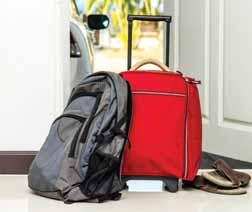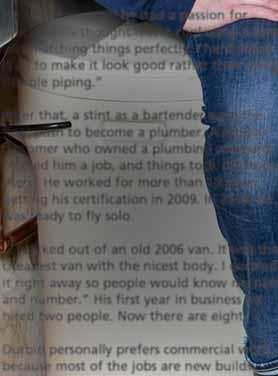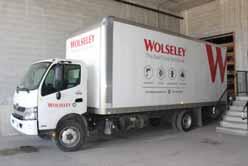
5 minute read
ASK ROGER Addressing and monitoring safety practices during a pandemic Roger Grochmal We’ve needed to adopt additional measures to protect customers and our team
Addressing Addressing and monitoring safety and monitoring safety practices during a pandemic practices during a pandemic


Roger Grochmal recently retired from his position of CEO of AtlasCare in Oakville, ON. Email Mechanical Business Magazine’s editor, Kerry Turner, kerry.turner@mechanicalbusiness with questions about your company, business practices, or the industry in general. How we interact as a business with our customers has changed a great deal in the past year. Globally, we have all learned over time what needs to be done to keep ourselves and those we interact with as safe and healthy as possible. As new variants of COVID-19 emerge, we have needed to adapt our personal behaviour and our businesses with regards to daily safety protocols. When you are a business that enters customers’ homes to work, ingraining those protocols amongst employees and making your safety practices public has become crucial to remaining operational.
Our policy has been to be as cautious as possible, with no exceptions. In some ways we had a running start: AtlasCare has always promised and delivered a safe experience to our customers. Part of that has been strong communication with our team and our customers. We email a photo and a brief bio of the technician who will arrive at the customer’s door and ensure our staff is healthy when going on calls. It has always been part of our culture to leave the area of the home we work in cleaner than when we arrive. In light of COVID-19, we’ve needed to adopt additional measures to protect our customers and our team.
Pandemic Safety Checklist
By April, we had established a strict safe call checklist to ensure consistency and maximum compliance across our organization:
1Employee COVID Screening Forms. Staff are required to submit a completed COVID health check list each morning before they can report for work. 2 Customer screening. Customers are asked health- and travelrelated questions about their household when they book the appointment, and technicians ask again at the front door prior to entering a home.
3Social distancing. We adopted strict social distancing and mask policies for all staff whether they are inside or outside a customer’s home or at the office in the instances where they absolutely need to be there. 4 Daily deep clean and sanitizing of all trucks each morning. Our trucks are normally kept clean, but now they go through a thorough sanitization each morning.


5Masks. Like most organizations we adopted mandatory face covering ring requirements for all staff ff from the moment they leave their vehicles until they return to them. We also ask customers to wear face coverings.
6Hand washing. As soon as we enter a customer’s home our staff give their hands a thorough wash using soap and towels that we supply. They also wash their hands carefully when they finish their work before they leave the home.
7Remove our garbage. Where previously we may have left packaging or other garbage in customers’ waste bins, now as an extra precaution we remove any garbage the project produces.
8Sanitize our tools. Between service calls, our technicians are required to fully clean and sanitize the tools they used.
9100 per cent contactless experience. From reviewing options to making a payment, we have established a fully non-contact process.
Monitoring acceptance and compliance
Of course, policies are nothing more than writing on a sheet of O paper if they are not practiced properly. How do we ensure these pa guidelines are put into practice? guid Having a consistent list of requirements such as those noted earlier are Having an important first step. When a process becomes routine, we know it is an imp more likely to be adopted and important steps will not be forgotten. Beyond that, AtlasCare’s strategy has been one of open communication, supporting employee wellbeing and ensuring they feel empowered to act. We know from our experience over the years that when people feel cared for and trusted, they are a whole lot more likely to make the right choices. Early in 2020 we expanded our existing Employee Assistance Program (EAP) in our employee health benefits plan to include the ability for staff to access a physician or healthcare professional online, 24/7, should they or anyone in their home feel ill. We also foster an environment of teamwork and support: rather than “rat out” a co-worker for forgetting to follow our guidelines, our staff are encouraged to remind one another. If an employee’s lax safety procedures persist, staff have a direct line to management to report their concern. Our employees are also fully empowered to leave a customer’s home immediately if they don’t feel it is a safe environment. One example is a customer who in our screening claimed to have not travelled recently, yet our technician arrived to notice luggage in the front hall with airline tags intact. The customer confirmed they had returned from Florida the day before and that it wasn’t a “big deal” in their eyes. Our employee called his manager who spoke to the customer. The employee was then instructed to leave for his own safety. Beyond these measures, we also have extensive customer communications in place to invite feedback about our team’s performance. This includes follow-up emails that offer a direct line to company management, and active promotion of our review platforms such as HomeStars, Google and Facebook. Our marketing team actively monitors all reviews, connects with customers for more discussion when necessary, and ensures that staff learn about positive and negative feedback as a means of continuously improving how we work to do the best possible job for our customers.








